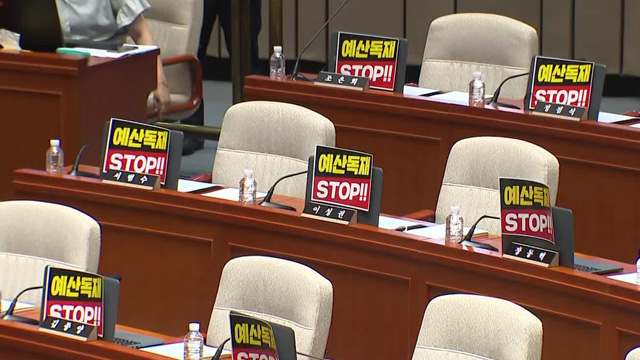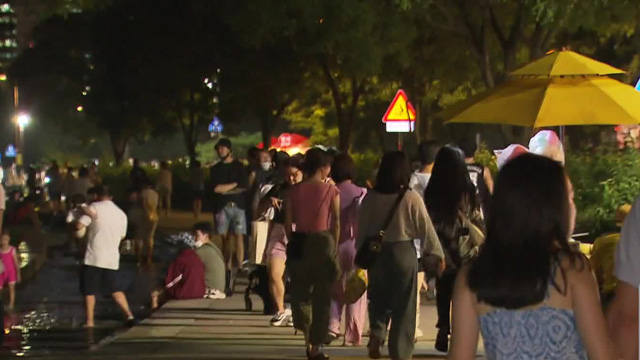[Anchor]
China, with its vast population, has long been called the "1.4 billion population powerhouse."
However, even China is now worried about low birth rates.
With the population declining for three consecutive years, kindergartens are closing down one after another.
This is reporter Kim Hyo-shin from Beijing.
[Report]
This is a kindergarten in Xi'an, China.
The kindergarten recently closed abruptly due to the decline in student numbers, which made operations difficult.
The children now have to travel far from home to attend kindergarten.
[Parent of a closed kindergarten: "What happens to the tuition fees we already paid if the kids stay at home? What are we supposed to do?!"]
Even the capital city of Beijing, known for its crowds, cannot escape the effects of a declining population.
Out of the three kindergartens in this complex, one has closed this year.
In total, more than 20,000 kindergartens closed in China last year alone.
This means that an average of over 50 kindergartens are disappearing in China every day.
The number of closed kindergartens has increased for three consecutive years, with the rate of increase accelerating each year.
In places like Beijing, which are known as 'first-tier cities' with the highest economic power and living standards, the average cost of raising one child is over 300 million won.
As a result, the so-called 'singlehood generation,' who view marriage with apprehension, has emerged, contributing to a population decline.
The scale of teacher recruitment is also decreasing, negatively impacting youth unemployment.
[Parent: "All my colleagues around me are experiencing unemployment. In this environment, who would dare to have children?"]
China has implemented measures to fight the low birth rate, such as extending maternity leave to six months and providing housing purchase subsidies, but these efforts seem insufficient to reverse the trend of population decline.
This is Kim Hyo-shin from KBS News in Beijing.
China, with its vast population, has long been called the "1.4 billion population powerhouse."
However, even China is now worried about low birth rates.
With the population declining for three consecutive years, kindergartens are closing down one after another.
This is reporter Kim Hyo-shin from Beijing.
[Report]
This is a kindergarten in Xi'an, China.
The kindergarten recently closed abruptly due to the decline in student numbers, which made operations difficult.
The children now have to travel far from home to attend kindergarten.
[Parent of a closed kindergarten: "What happens to the tuition fees we already paid if the kids stay at home? What are we supposed to do?!"]
Even the capital city of Beijing, known for its crowds, cannot escape the effects of a declining population.
Out of the three kindergartens in this complex, one has closed this year.
In total, more than 20,000 kindergartens closed in China last year alone.
This means that an average of over 50 kindergartens are disappearing in China every day.
The number of closed kindergartens has increased for three consecutive years, with the rate of increase accelerating each year.
In places like Beijing, which are known as 'first-tier cities' with the highest economic power and living standards, the average cost of raising one child is over 300 million won.
As a result, the so-called 'singlehood generation,' who view marriage with apprehension, has emerged, contributing to a population decline.
The scale of teacher recruitment is also decreasing, negatively impacting youth unemployment.
[Parent: "All my colleagues around me are experiencing unemployment. In this environment, who would dare to have children?"]
China has implemented measures to fight the low birth rate, such as extending maternity leave to six months and providing housing purchase subsidies, but these efforts seem insufficient to reverse the trend of population decline.
This is Kim Hyo-shin from KBS News in Beijing.
■ 제보하기
▷ 카카오톡 : 'KBS제보' 검색, 채널 추가
▷ 전화 : 02-781-1234, 4444
▷ 이메일 : kbs1234@kbs.co.kr
▷ 유튜브, 네이버, 카카오에서도 KBS뉴스를 구독해주세요!
- Population decline in China
-
- 입력 2025-06-30 03:31:33

[Anchor]
China, with its vast population, has long been called the "1.4 billion population powerhouse."
However, even China is now worried about low birth rates.
With the population declining for three consecutive years, kindergartens are closing down one after another.
This is reporter Kim Hyo-shin from Beijing.
[Report]
This is a kindergarten in Xi'an, China.
The kindergarten recently closed abruptly due to the decline in student numbers, which made operations difficult.
The children now have to travel far from home to attend kindergarten.
[Parent of a closed kindergarten: "What happens to the tuition fees we already paid if the kids stay at home? What are we supposed to do?!"]
Even the capital city of Beijing, known for its crowds, cannot escape the effects of a declining population.
Out of the three kindergartens in this complex, one has closed this year.
In total, more than 20,000 kindergartens closed in China last year alone.
This means that an average of over 50 kindergartens are disappearing in China every day.
The number of closed kindergartens has increased for three consecutive years, with the rate of increase accelerating each year.
In places like Beijing, which are known as 'first-tier cities' with the highest economic power and living standards, the average cost of raising one child is over 300 million won.
As a result, the so-called 'singlehood generation,' who view marriage with apprehension, has emerged, contributing to a population decline.
The scale of teacher recruitment is also decreasing, negatively impacting youth unemployment.
[Parent: "All my colleagues around me are experiencing unemployment. In this environment, who would dare to have children?"]
China has implemented measures to fight the low birth rate, such as extending maternity leave to six months and providing housing purchase subsidies, but these efforts seem insufficient to reverse the trend of population decline.
This is Kim Hyo-shin from KBS News in Beijing.
China, with its vast population, has long been called the "1.4 billion population powerhouse."
However, even China is now worried about low birth rates.
With the population declining for three consecutive years, kindergartens are closing down one after another.
This is reporter Kim Hyo-shin from Beijing.
[Report]
This is a kindergarten in Xi'an, China.
The kindergarten recently closed abruptly due to the decline in student numbers, which made operations difficult.
The children now have to travel far from home to attend kindergarten.
[Parent of a closed kindergarten: "What happens to the tuition fees we already paid if the kids stay at home? What are we supposed to do?!"]
Even the capital city of Beijing, known for its crowds, cannot escape the effects of a declining population.
Out of the three kindergartens in this complex, one has closed this year.
In total, more than 20,000 kindergartens closed in China last year alone.
This means that an average of over 50 kindergartens are disappearing in China every day.
The number of closed kindergartens has increased for three consecutive years, with the rate of increase accelerating each year.
In places like Beijing, which are known as 'first-tier cities' with the highest economic power and living standards, the average cost of raising one child is over 300 million won.
As a result, the so-called 'singlehood generation,' who view marriage with apprehension, has emerged, contributing to a population decline.
The scale of teacher recruitment is also decreasing, negatively impacting youth unemployment.
[Parent: "All my colleagues around me are experiencing unemployment. In this environment, who would dare to have children?"]
China has implemented measures to fight the low birth rate, such as extending maternity leave to six months and providing housing purchase subsidies, but these efforts seem insufficient to reverse the trend of population decline.
This is Kim Hyo-shin from KBS News in Beijing.
-
-

김효신 기자 shiny33@kbs.co.kr
김효신 기자의 기사 모음
-
이 기사가 좋으셨다면
-
좋아요
0
-
응원해요
0
-
후속 원해요
0















이 기사에 대한 의견을 남겨주세요.